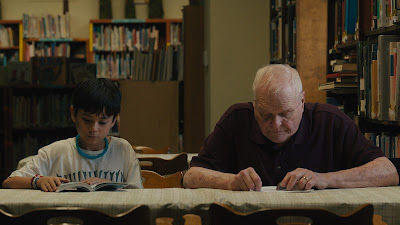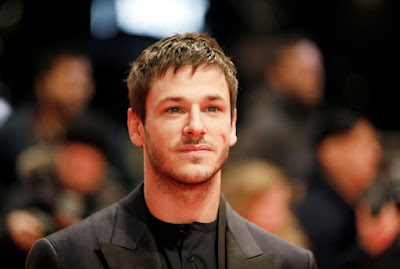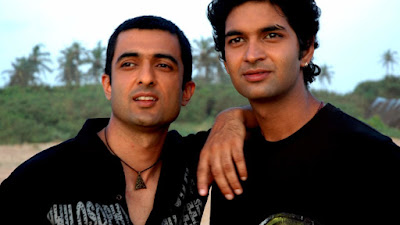Monday 31 January 2022
Tree of strife: "Taming the Garden"
Sunday 30 January 2022
On demand: "Driveways"
Saturday 29 January 2022
On demand: "Gabbeh"
Friday 28 January 2022
For what it's worth...
My top five:
1. Annette
1. The Searchers (Saturday, BBC2, 1.50pm)
In memoriam: Gaspard Ulliel (Telegraph 24/01/22)
His wolfishly handsome looks were a boon for brands trying to catch the consumer’s eye. In 2008, he appeared alongside Kate Moss in print ads for Longchamp, and in a 2010 Chanel ad directed by Martin Scorsese, he played a director flummoxed during a press conference by memories of a former love. His film work revealed a gentility reminiscent of earlier eras: as he once told Le Figaro, “I am an old soul in a young body.”
Ulliel was born on November 25, 1984 in the Parisian suburb of Boulogne-Billancourt, to designer Serge Ulliel and his stylist wife Christine. At the age of six, he was attacked by a friend’s Dobermann, leaving him with a scar on his left cheek; he would later call it “a nice gash that turns into a dimple”, while the newspaper Libération dubbed it “the most famous scar in French cinema”.
He made his debut aged 12 in the TV medical drama Une Femme en Blanc (1996) alongside Sandrine Bonnaire: “I began really by chance. A friend of a friend of my mother’s was opening an agency, and she was looking for young kids… I joined the agency more out of curiosity than real passion.” Yet he described his first day on set as “a revelation”: “I liked the atmosphere, the concentration, the teamwork, the same energy directed towards the same goal.”
Carefully steered towards acting (“my parents didn't want me to miss school, so I was working just once or twice a year”), he made his big-screen debut as a wounded shepherd in the blood-soaked fantasy Brotherhood of the Wolf (2001). After completing lycée, he earned his first César nomination for Most Promising Male Newcomer in Michel Blanc’s enjoyable Joseph Connolly adaptation Summer Things (2002), then studied film at the University of Saint-Denis.
While performing at the Cours Florent stage school, he’d caught the eye of the veteran French director Téchiné, who cast Ulliel in the WW2 drama Strayed (2004). Playing a young man who assists widowed schoolmarm Emmanuelle Béart as she flees Nazi-occupied Paris, Ulliel demonstrated an attentive courtliness – indeed, a pivotal sex scene was delayed until the final day of shooting to help the young actor conquer his nerves.
Again, he was nominated at the Césars; again, he lost out. But he finally won Most Promising Newcomer in 2005 for playing Audrey Tautou’s absent beloved in Jeunet’s lavish, chocolate-boxy WW1 opus A Very Long Engagement (2004).
Hannibal Rising was meant to be his international breakout, rushed into production off the back of author Thomas Harris’s just-published origin story, which found the killer emerging from the ashes of Nazi-ravaged Lithuania. Yet the film proved listless camp, barely recouping its budget despite a wide release.
He fared better playing a real-life sacred monster – Yves Saint Laurent – in Bertrand Bonello’s Saint Laurent (2014), which drew mixed reviews upon its Cannes debut, but earned Ulliel his first César nomination for Best Actor. In a choice awards-season quirk, he lost to Pierre Niney, the Saint Laurent in the rival biopic Yves Saint Laurent (2014). Yet with its full-frontal nudity, Ulliel’s performance demonstrated a newfound maturity: he was no more the blushing babe of Strayed, and no longer to be considered just a pretty face.
His crowning glory came with Xavier Dolan’s It’s Only the End of the World (2016), a starry ensemble piece in which he played a terminally ill writer undergoing an especially draining homecoming. Reviews were again mixed – even the Telegraph’s Tim Robey, in a broadly enthusiastic appraisal, acknowledged the drama was “frequently infuriating”. Nevertheless, Ulliel’s shaded turn finally landed him the Best Actor César, at the age of 32.
His international profile was set for a further boost later this year. On the day Ulliel collided with another skier on the slopes of the Swiss Alps, Marvel released the trailer to their new sci-fi series Moon Knight, in which the actor appears alongside Oscar Isaac and Ethan Hawke; the show will premiere on Disney+ in March.
In a statement to mark the actor’s passing, President Emmanuel Macron described Ulliel as “an icon of French elegance who dazzled the camera”. Prime Minister Jean Castex noted that “Gaspard Ulliel grew up with French cinema, and French cinema grew up with him. They loved each other madly.”
Ulliel is survived by his girlfriend, the model and singer Gaëlle Piétri, and their son Orso, who was born in 2016.
Gaspard Ulliel, born 25 November 1984, died 19 January 2022.
Thursday 27 January 2022
On demand: "ear for eye"
Wednesday 26 January 2022
On demand: "Lapsis"
Tuesday 25 January 2022
On demand: "Censor"
Monday 24 January 2022
Uneasy virtue: "A Hero"
Saturday 22 January 2022
On demand: "My Brother... Nikhil"
Friday 21 January 2022
For what it's worth...
My top five:
1. Annette
1. Westworld [above] (Friday, BBC1, 11.25pm)
On demand: "Pushpa: The Rise - Part 01"
On demand: "Swan Song"
Wednesday 19 January 2022
From the archive: "The Woman in Black 2: Angel of Death"
In memoriam: Jean-Jacques Beineix (Telegraph 17/01/22)
Beineix’s detractors soon retaliated: The Moon in the Gutter (1983), torn from novelist David Goodis’s dockside noir, provoked loud boos at Cannes. Yet Betty Blue, an adaptation of Philippe Djian’s novel 37° 2 le matin about the amour fou between a beach-house painter (Jean-Hugues Anglade) and a troubled young woman (Béatrice Dalle), was a phenomenon. Where its predecessor was murky and airless, the new film was all sun-kissed, voluptuous flesh; its unabashed couplings prompted much the same scurrilous (and unfounded) gossip that had dogged Don’t Look Now.
The critical response was measured, weighing the film’s heady passion against the relentless maleness of its gaze. Roger Ebert dismissed it as “a movie about Béatrice Dalle’s boobs and behind… everything else is just what happens in between the scenes where she displays them.” Yet it became a huge hit and a defining artefact of its moment. Oscar-nominated for Best Foreign Film, it made an icon out of Dalle, the film’s sultry poster becoming a fixture on the walls of cinephile bedsits worldwide.
It was also the beginning of the end. Where his compatriot Luc Besson took the cinéma du look to new commercial heights with The Big Blue (1988) and Nikita (1989), Beineix struggled to match his earlier triumphs. The circus-set Roselyne and the Lions (1989) seemed twee set against Betty Blue’s full-bodied swooning, although it handed Beineix a new muse (and briefly lover) in the model-turned-actress Isabelle Pasco.
A self-confessed misanthrope, Beineix became only more irascible around journalists, bringing his own recording equipment to interviews in which he vented his mounting frustrations and refused to kneel before what he called “the altar of Cahiers du Cinéma”: “France is a very strange country… In America, Diva is taught in universities. In France, you’re told not to like it.”
A keen cinema-goer, he nevertheless studied medicine before switching his attentions to film. He failed the entrance exam for the state film school IDHEC but landed a job as a runner on the television series Les Saintes chéries (1965-70) and worked as an assistant director to the likes of Claude Berri and René Clément through the 1970s.
Yet the conspicuous failure of the self-funded, sub-Hitchcockian thriller Mortel Transfert (2001) was a heavy personal and financial blow, and left producers nervy about giving him further chances. His final credit, Les Gaulois au-delà du mythe (2013), was a well-received yet wholly self-effacing ARTE documentary on recent developments in French archaeology.














